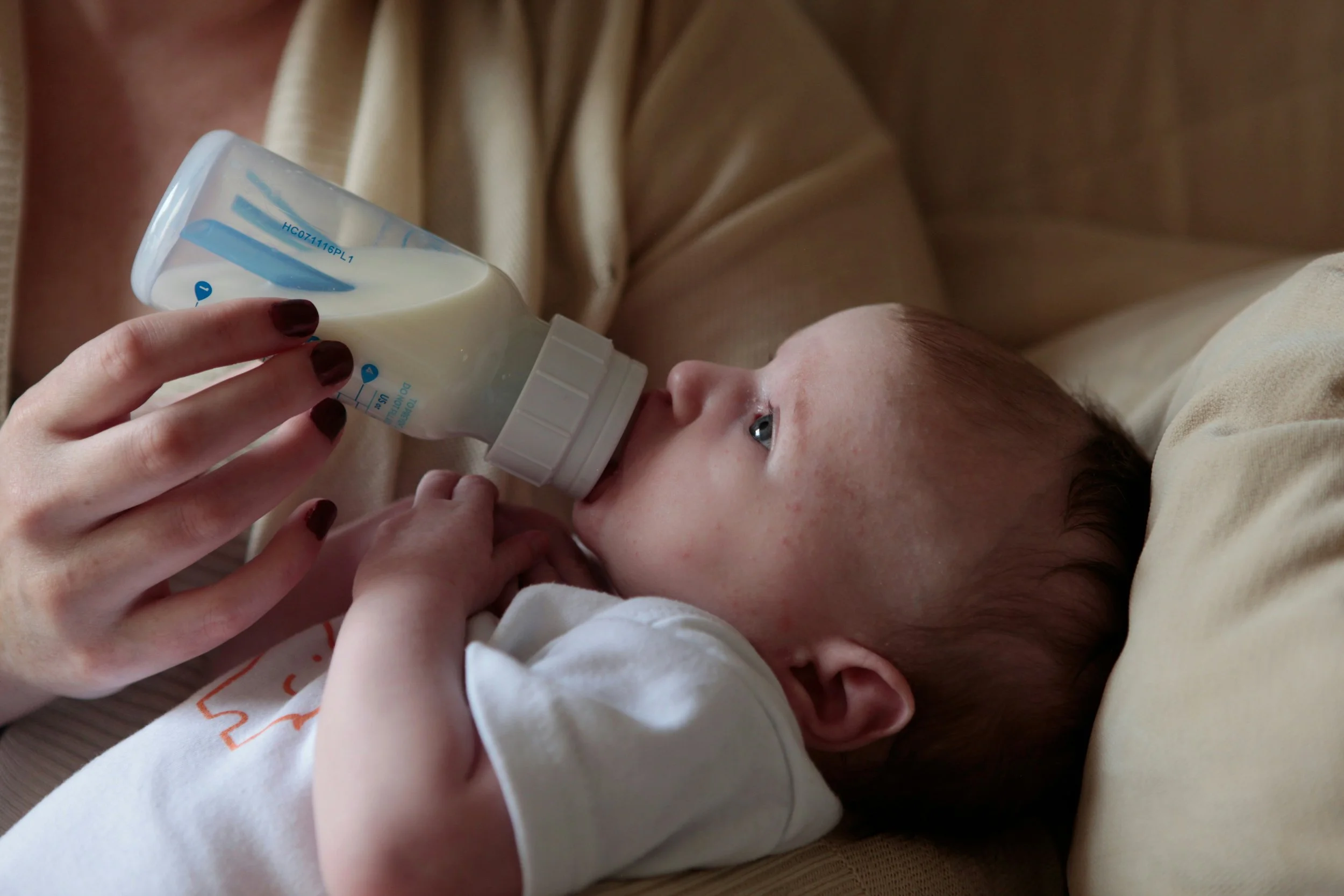Why Breastfeeding Feels So Mentally Hard: 3 Myths that Cause Shame
When I was pregnant, I heard a lot about how breastfeeding is beneficial for the baby. I also noticed people sharing information about the psychological benefits of breastfeeding for the mother. Breastfeeding can decrease the risk for postpartum depression and anxiety and can increase self-esteem, empowerment, and emotional regulation (Modak, Anushree et al. 2023).
I wasn’t sure how our breastfeeding would go, and I did my best to gain some knowledge before giving birth. Unfortunately, we faced a lot of challenges that led me to exclusively pumping. I was one of those people whose mental health did not benefit from breastfeeding. From the start, breastfeeding felt so hard, physically and mentally. I was experiencing pain, intrusive thoughts, anxiety, and overwhelm. I knew I needed help.
Fortunately, I had a fantastic Lactation Consultant who was incredibly knowledgeable and supportive. If you’re in Central Florida, reach out to Sabrina at Baby Bliss Feeding! She saved me.
Despite having a great personal and professional support system, I experienced a mix of emotions about our feeding journey. There was grief, guilt, anxiety, perfectionism, and overwhelm. I felt like I should be able to breastfeed without pumping.
I wrestled with negative feelings about myself. I felt bad that I didn’t like breastfeeding. Many moms seemed to love it, but hate pumping. But here I was, pumping 6-8 times per day because breastfeeding at my chest was so miserable.
What do you do when breastfeeding doesn’t work out as you imagined? What if you’re one of those moms whose mental health worsens because of breastfeeding? I’m here to tell you, it isn’t your fault. And it’s normal to grieve the breastfeeding experience you didn’t have.
Why is Breastfeeding so Hard for me?
Breastfeeding is a unique experience for each mother. There is not one type of journey, and no journey is better than any other. There are dozens of reasons why breastfeeding takes such a physical and mental toll. Do any of these factors apply to you?
Pre-existing mental health conditions such as depression, anxiety, or OCD
Pre-existing health conditions such as PCOS, Breast Cancer and Treatments, Thyroid Conditions, and more
Neurodivergence (Autism, ADHD, and more) or Highly Sensitive Person Trait
Lack of professional support from a pediatrician, OBGYN, Midwife, or Lactation Consultant
Lack of personal support from your partner, family, or friends
Supply issues (Over supply or under supply)
Sleep deprivation
Lower pain tolerance
Full-time or part-time work that does not make breastfeeding or pumping easy
Birth trauma or birth complications
In addition to this list, we will examine three key myths that make breastfeeding even more challenging mentally and emotionally. Let’s break those down and help release your worries.
Myth #1: Good Parents Exclusively Breastfeed
This belief runs deep. I didn’t realize how much I felt this until breastfeeding wasn’t going how I imagined it would go. The culture has shifted to embracing breastfeeding over the years, which is, of course, wonderful. But with it, the attitude that good mothers breastfeed has tagged along.
According to this study, “Breastfeeding rates in the United States increased significantly between 1993 and 2006. The percentage of infants who were ever breastfed increased from 60% among infants born in 1993-1994 to 77% among infants born in 2005-2006.”
The phrase “breast is best” is a well-known slogan promoting the nutritional and health benefits of breastfeeding for babies. The campaign was launched in the 1990s by the World Health Organization and was soon recommended for breastfeeding for the first six months of a baby’s life.
“Baby formula soon became a popular product, one that was marketable — perhaps too much so. Commercialized campaigns to bring it to more and more markets led to it being pushed on parents in developing countries who often could not afford it or did not have reliable access to clean drinking water. This ultimately led to many infants dying from starvation or malnutrition.”
Although the campaign is important and highlights the tragedy of thousands of families being exploited by formula companies, it’s still a phrase that can cause mothers a lot of distress.
I firmly believe that families worldwide deserve support, accurate information, resources, and access to make breastfeeding possible. However, the belief that breastfeeding is what the best mothers do is harmful. “Breast is Best” highlights the advantages of breast milk, but it can place a lot of pressure, guilt, and shame on mothers who cannot or choose not to breastfeed.
There are many reasons why breastfeeding is extremely difficult or impossible, as listed above. Some mothers do not want to breastfeed exclusively and prefer to formula feed. Some mothers combo feed by breastfeeding and using formula.
Many mothers try to breastfeed and then feel like failures when it’s so tough. They feel like failures when they have to turn to formula to feed their baby. They feel like they should have tried harder. They should have pushed through.
Research shows that a mother’s well-being is the strongest predictor of both family stability and a child’s long-term success in adulthood.
It’s okay if you couldn’t push through. Your health and wellbeing matter too. You are still a good mother. You fed your baby and took care of them.
Myth #2: Exclusively Breastfeeding is All or Nothing
The AAP advises parents to avoid introducing formula during the first six months.
Cultural norms and medical guidelines remain unchanged, despite evidence suggesting that mindful supplementation of formula can help alleviate stress and provide parents with the breathing room they need to focus on developing a strong latch and a healthy milk supply.
Research has also shown that the Baby Friendly Hospital Initiative, which aimed to increase breastfeeding rates by reducing formula use in hospitals, did not improve breastfeeding outcomes for families discharged from those facilities.
Although the AAP and many hospitals promote exclusive breastfeeding, nurses and doctors may still offer formula for a range of reasons, often without absolute necessity. Families are sometimes discharged with formula samples but no clear guidance on when, or even if, they should be used, leaving new parents feeling uncertain and conflicted from the very start.
Imagine trying to support your milk supply, feeling like formula is bad, and worrying that your baby is going hungry as you struggle with the learning curve that is breastfeeding. That would be distressing for any mother and contribute to depression and anxiety.
The reality is, breastfeeding comes in many forms. It is okay to pump, use formula, nurse, use a Supplemental Nursing System, or any combination of these techniques!
Myth #3: I’m Failing My Baby if I don’t Exclusively Breastfeed
Every choice in motherhood can feel huge. It feels like there is so much at stake. If I don’t make the right choices, what does that say about me as a mom?
Feeding is such a personal journey for each family. If your baby is fed, you’re doing it right.
This is one I felt deeply and spent a long time wrestling with. If breastmilk is the best for my baby, shouldn’t I do everything to breastfeed exclusively for the first year? I had a tough time accepting that my feeding journey didn’t make me less worthy as a mom. It didn’t mean I loved my baby less or that I didn’t sacrifice for my baby.
We love our babies so much that we want to do what’s recommended for them. We want to provide for them and meet their needs. It’s so easy to feel like we’re falling short if we can’t do it all perfectly.
You are not a failure. You are trying. You are showing up despite the anxiety, sleep deprivation, work, and the immense weight of responsibility. Your baby is loved.


